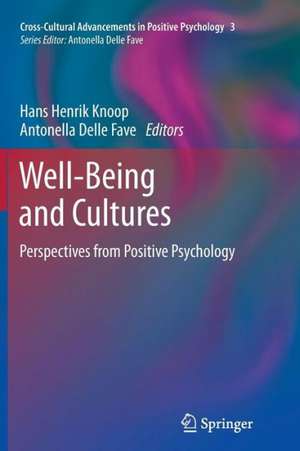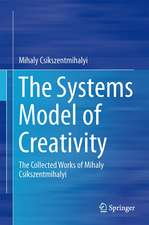Well-Being and Cultures: Perspectives from Positive Psychology: Cross-Cultural Advancements in Positive Psychology, cartea 3
Editat de Hans Henrik Knoop, Antonella Delle Faveen Limba Engleză Paperback – 21 sep 2014
| Toate formatele și edițiile | Preț | Express |
|---|---|---|
| Paperback (1) | 554.97 lei 39-44 zile | |
| SPRINGER NETHERLANDS – 21 sep 2014 | 554.97 lei 39-44 zile | |
| Hardback (1) | 644.49 lei 6-8 săpt. | |
| SPRINGER NETHERLANDS – aug 2012 | 644.49 lei 6-8 săpt. |
Din seria Cross-Cultural Advancements in Positive Psychology
- 24%
 Preț: 593.47 lei
Preț: 593.47 lei - 18%
 Preț: 939.28 lei
Preț: 939.28 lei - 20%
 Preț: 570.72 lei
Preț: 570.72 lei - 18%
 Preț: 894.97 lei
Preț: 894.97 lei - 15%
 Preț: 648.89 lei
Preț: 648.89 lei - 24%
 Preț: 890.15 lei
Preț: 890.15 lei - 18%
 Preț: 793.63 lei
Preț: 793.63 lei - 18%
 Preț: 950.96 lei
Preț: 950.96 lei - 18%
 Preț: 947.35 lei
Preț: 947.35 lei - 18%
 Preț: 948.79 lei
Preț: 948.79 lei - 18%
 Preț: 961.41 lei
Preț: 961.41 lei - 15%
 Preț: 643.00 lei
Preț: 643.00 lei - 15%
 Preț: 646.30 lei
Preț: 646.30 lei - 18%
 Preț: 836.22 lei
Preț: 836.22 lei - 15%
 Preț: 643.34 lei
Preț: 643.34 lei - 15%
 Preț: 650.69 lei
Preț: 650.69 lei
Preț: 554.97 lei
Preț vechi: 693.71 lei
-20% Nou
Puncte Express: 832
Preț estimativ în valută:
106.19€ • 111.10$ • 88.22£
106.19€ • 111.10$ • 88.22£
Carte tipărită la comandă
Livrare economică 31 martie-05 aprilie
Preluare comenzi: 021 569.72.76
Specificații
ISBN-13: 9789400795891
ISBN-10: 9400795890
Pagini: 228
Ilustrații: VI, 222 p.
Dimensiuni: 155 x 235 x 12 mm
Greutate: 0.33 kg
Ediția:2013
Editura: SPRINGER NETHERLANDS
Colecția Springer
Seria Cross-Cultural Advancements in Positive Psychology
Locul publicării:Dordrecht, Netherlands
ISBN-10: 9400795890
Pagini: 228
Ilustrații: VI, 222 p.
Dimensiuni: 155 x 235 x 12 mm
Greutate: 0.33 kg
Ediția:2013
Editura: SPRINGER NETHERLANDS
Colecția Springer
Seria Cross-Cultural Advancements in Positive Psychology
Locul publicării:Dordrecht, Netherlands
Public țintă
ResearchCuprins
Chapter 1. Positive Psychology and cros-cultural research; Hans Henrik Knoop and Antonella Delle Fave.- Chapter 2. VIA Character Strenghts -Research and Practice: The First 10 Years; Ryan M. Niemiec.- Chapter 3. Addressing current challenges in cross-cultural measurement of well-being: The Pemberton Happiness Index; Carmelo Vazquez and Gonzalo Hervas.- Chapter 4. Comnunal values and individualism in our era of globalization: A comparative longitudinal study of different societies; Holde Eileen Nafstad and Erland Sand Bruer.- Chapter 5. The Relation of Basic Psychological Needs, Intrinsic and Extrinsicc Life Goals and Collectivism with Subjective Well-Being; A Case in Macedonia.- Chapter 6. The Ubiquity of the Character Strenghts in African Traditional Religion: A Thematic Analysis.- Chapter 7. Culture, Environmental Psychology and Well-Being: An Emergent Theoretical Framework; Nicola Rainisio.- Chapter 8. Religion, Spirituality and Well-Being across Nations: The Eudaimonic and Hedonic Happiness Investigation; Antonella Delle Fave, Ingrid Brdar, Dianne Vella-Brodrick and Marie P. Wissing.- Chapter 9. The Relationship of South African consumers' living standards and demographic variables with their life satisfaction.- Chapter 10. Circumstances of Well-Being among Czech College Students; Iva Solcava and Vladimir Kebza.- Chapter 11. Income is Not Associated with positive Affect, Life Satisfaction, and Subjective Happiness among Japanese Workers; Yasumasa Otsuka, Masashi Hori, and Junko Kawahito.- Chapter 12. Relationships between self Serving Attributional Bias and Subjective Well-being among Danish and Spanish Women; Pilar Sanjuana and Kristine Jensen de Lopez.- Chapter 13. Optimistic Attributional Style and Parental Behaviour in the Educational Framework: A Cross-Cultural Perpective; Loredana Ruxandra Gherasim, Simona Butnaru, Alin Gavreliuc and Luminita Mihaela Iacob.-
Notă biografică
Hans Henrik Knoop is Associate Professor of educational psychology and Director of the Positive Psychology Research Unit at the Danish School of Education, University of Aarhus, Denmark. His work is focused on learning and creativity in education and professional work, currently collaborating with more than 12.000 pupils and 2.000 teachers.
For more than a decade Hans Henrik Knoop has been involved in research cooperation with colleagues at Harvard University, Stanford University and at Claremont Graduate University in the GoodWork® Project and as researcher he has participated in development projects for LEGO (1998-2004), Danfoss Universe (2005-2010), SIS Akademi (2004-2008) and Royal Greenland Academy (2006), among others. In 2006-2007 contributed to the Danish DR2’s programs on talent development in schools, and he was the scholarly anchor of the Danish TV2’s reality documentary series “Plan B” (2006-2007) and “SKOLEN – verdensklasse på 100 dage” [The school – world class in 100 days] (2008) concerning efficient education. “Plan B” received international attention in being nominated for the prestigious television award Golden Rose of Montreux in 2007. From 2007-2010 he was Research Director at the Universe Research Lab in Denmark.
Antonella Delle Fave, MD, specialist in clinical psychology, is professor of psychology at the Faculty of Medicine of the University of Milan. She is currently Treasurer and President-Elect of IPPA, President of the European Network of Positive Psychology and President of the Italian Society of Positive Psychology.
Dr. Delle Fave is author of numerous research publications, many of them on optimal living and positive health. Recently she helped create a new psychological measure, The Eudaimonic Happiness Inventory.
For more than a decade Hans Henrik Knoop has been involved in research cooperation with colleagues at Harvard University, Stanford University and at Claremont Graduate University in the GoodWork® Project and as researcher he has participated in development projects for LEGO (1998-2004), Danfoss Universe (2005-2010), SIS Akademi (2004-2008) and Royal Greenland Academy (2006), among others. In 2006-2007 contributed to the Danish DR2’s programs on talent development in schools, and he was the scholarly anchor of the Danish TV2’s reality documentary series “Plan B” (2006-2007) and “SKOLEN – verdensklasse på 100 dage” [The school – world class in 100 days] (2008) concerning efficient education. “Plan B” received international attention in being nominated for the prestigious television award Golden Rose of Montreux in 2007. From 2007-2010 he was Research Director at the Universe Research Lab in Denmark.
Antonella Delle Fave, MD, specialist in clinical psychology, is professor of psychology at the Faculty of Medicine of the University of Milan. She is currently Treasurer and President-Elect of IPPA, President of the European Network of Positive Psychology and President of the Italian Society of Positive Psychology.
Dr. Delle Fave is author of numerous research publications, many of them on optimal living and positive health. Recently she helped create a new psychological measure, The Eudaimonic Happiness Inventory.
Textul de pe ultima copertă
This anthology focuses on empirical studies comparing cultures in relation to central positive psychological topics. It contains selected papers from the 5th European Conference on Positive Psychology held in 2010 in Denmark. The book starts out with an introductory chapter that brings together the main ideas and findings within an integrative perspective, based on a broad theoretical framework encompassing interdisciplinary and methodological issues. It gives special emphasis to some open issues in the theory and assessment of culture-related dimensions, and to the potential of positive psychology in addressing them. The introductory chapter is followed by two chapters that examine theoretical approaches and instruments developed to assess happiness and well-being across cultures. Following that examination, five chapters are devoted to the relationship between well-being, cultures and values. The second half of the book prominently investigates well-being across cultures in the light of socio-economic factors.
This book shows that positive psychology, now officially well into its second decade, is providing still finer-grained perspectives on the diversity of cultures along with insights about our shared human nature, uniting us for better or worse.
This book shows that positive psychology, now officially well into its second decade, is providing still finer-grained perspectives on the diversity of cultures along with insights about our shared human nature, uniting us for better or worse.
Caracteristici
Contributes to a broader understanding of positive psychology between and across cultures Brings together highly talented researchers working on important issues of human living Combines theory with methodology and empirical studies ?












